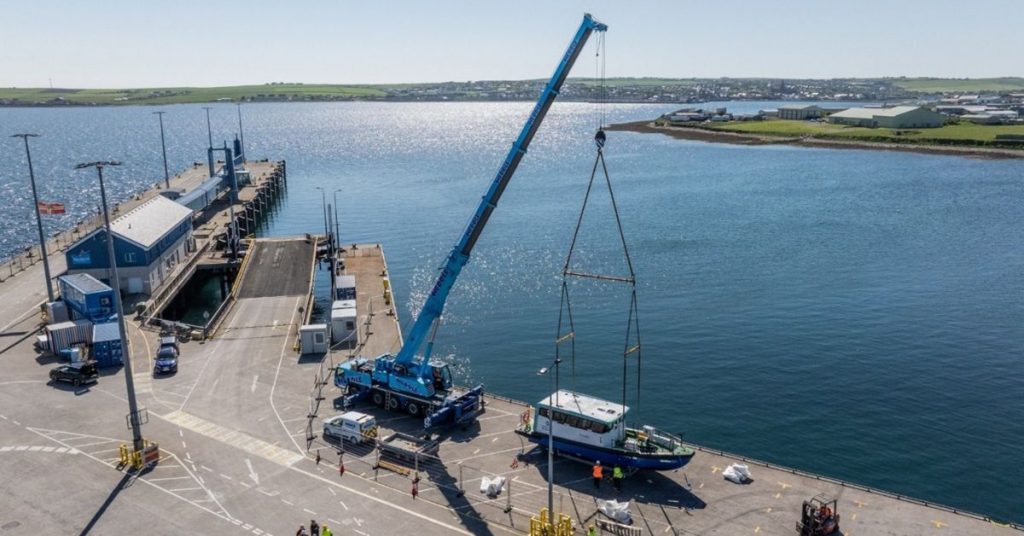In a bold stride toward the future of clean maritime transport, Artemis Technologies has delivered its cutting-edge electric hydrofoil vessel, Zevi 1, to the Orkney Islands—marking a major milestone for the ambitious Electric Orkney project. Sleek, silent, and sustainable, this next-generation workboat is set to transform how island communities connect, setting the stage for a new era of zero-emission sea travel.
Built in Belfast, Zevi 1 is the first of two advanced electric vessels being introduced as part of the project, which is being delivered in collaboration with Orkney Ferries and the European Marine Energy Centre (EMEC). The goal is to showcase how electric hydrofoil vessels can enhance connectivity between Orkney’s islands while contributing to the UK’s broader decarbonisation goals.
Over the next several months, Zevi 1 will undergo sea trials in local waters to evaluate its performance in Orkney’s unique marine environment. The vessel, which carries up to 12 passengers, will eventually be deployed on a three-year trial route linking Kirkwall with Shapinsay, Egilsay, Wyre, and Rousay with four daily rotations.
To support the operation, an ultra-fast charging station has also been installed in Kirkwall. The system can recharge the 12-metre vessel in under an hour, ensuring efficient turnaround times and continuous service capability.
Councillor Mellissa Thomson, Chair of Orkney Ferries, expressed her enthusiasm about the development:
“The arrival of this groundbreaking vessel is a significant step for our islands. We’re excited to see Zevi 1 begin its testing phase and confident that it will deliver a smoother, quieter, and more sustainable service for our communities.”
Dr Iain Percy, CEO of Artemis Technologies, emphasized the project’s long-term vision:
“This vessel demonstrates the potential of our Artemis eFoiler® technology to cut emissions, reduce operational costs, and improve passenger experience. It’s a tangible step toward a cleaner future for maritime transport.”
The Artemis EF-12 Workboat XL utilizes cutting-edge hydrofoil technology that lifts the hull above the water, drastically reducing drag and improving efficiency. These benefits translate into lower fuel costs, near-silent operation, and minimal wake—ideal for both environmental and passenger comfort.
A second vessel, the Artemis EF-24 Passenger, is expected to join the project later this year, expanding the Electric Orkney fleet and reinforcing the region’s role as a pioneer in sustainable transport solutions.
The Electric Orkney initiative is partly funded by the UK Government through the UK Shipping Office for Reducing Emissions (UK SHORE), which has committed over £200 million since 2022 to foster innovation in maritime decarbonisation. Innovate UK, part of UK Research and Innovation, serves as the programme’s delivery partner.
Neale Ryan, Head of Land & Maritime Transport at Innovate UK, remarked:
“Electric Orkney is another shining example of UK SHORE’s mission to deliver cutting-edge, homegrown maritime innovation. This project not only demonstrates technological excellence but also creates meaningful impact in a community where ferries are a lifeline.”
With sea trials now underway, project stakeholders plan to share updates as results become available and the service prepares to launch officially.
Tags: Decarbonisation, Environment, Maritime, Shipping



Recent Posts
Stena Line’s Hybrid Ferry Stena Futura Completes Sea Trials, Set to Boost Irish Sea Freight Capacity
Taiwanese owner makes methanol move with WinGD across multiple engine orders
Econowind installs four VentoFoils on tanker M/T JUTLANDIA SWAN
Global Maritime Groups Unite to Launch Alliance for Electrification of Shipping Sector
India Charts Green Future for Maritime Sector with Hydrogen Hubs and Sustainable Port Strategy
ZeroNorth’s SMARTShip platform integrates with ClassNK MRV portal to automate emissions reporting
Towngas Partners with TLB, Pacific Basin to Advance Green Marine Fuel Infrastructure in Hong Kong
SECI Extends Bid Deadline for Green Ammonia Tender Under SIGHT Scheme